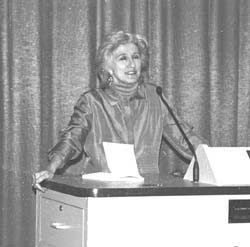|
News
|
|
|
Perspectives
|
|
|
Arts
|
|
|
Sports
|
|
|
Other
|
|

C.D. Wright Reads New Poetry
by Jessica McGuinness

|
|
Travel Verse: Wright read from her booklength poem Deepstep Come Shining Thursday. (photo by Claire Helene-Mershon) |
Born and raised in the Ozark Mountains, poet C. D. Wright identifies herself with what she describes as the bony, mean and grotesquely-humored "hill people" of her native Arkansas. Reading from her book-length poem Deepstep Come Shining, Wright treated Oberlin to a slice of her native sensibility on Thursday.
The author of nine books of poems and a professor at Brown University, Wright has received numerous fellowships and awards, including two fellowships from the National Endowment for the Arts, a Guggenheim Foundation Fellowship, the Witter Prize for Poetry from the American Academy and Institute for Arts and Letters and a Lannan Literary Award. On a fellowship by Lila Wallace-Reader's Digest Foundation, Wright curated "a walk-in book of Arkansas," a multimedia exhibition that toured her native state for a two-year period. Her visit was the last in a semester-long series of readings sponsored by the creative writing department.
Choosing to skip from passage to passage, she made her presentation more a poetic collage than a standard reading. Pausing briefly but often changing the inflection of her gentle voice, Wright split the poem into a quick and vivid dissection of the book. The poem travels at light speed through daily life, revolving around common images like cling peaches, Gold Bond Powder, Visine and razorblades. The images are raw and infused with a surprising importance.
Wright handled her reading capriciously, pulling the audience through a rapidly changing landscape and giving the palette a mixture of grace and a kind of doom. The way the poem sounded was also important - Wright was as interested in rhythm as she was aware of the emotional resonance of her images. Words seemed chosen intuitively but they alternately oozed and cracked against each other, rising and expanding and then falling away, closing up on each other.
Wright is well aquainted with her subjects. She identifies with jazz; in 1982, she authored Translations Of The Gospel Back Into Tongues, "a lamentation for the late Frank Stanford, poet from Arkansas, and a tribute to the great American experience of jazz."
Although much of Wright's work sustains a dedication to her Arkansas roots, she resists the idea of allowing herself to be caged within any one influence or identification: "I am a serious border-crosser," she wrote.
Wright maintains a consciousness of the economic and educational location of her ancestry (until her parent's generation, all her family were either dirt farmers or railroad workers) while allowing herself to be influenced by a range of artists including Miles Davis, Mikhail Bahktin and Akira Kurosawa. She says her poetry is "about desire, conflict, the dearth of justice for all. About persons of small means."
In Deepstep Come Shining, Wright explores the idea of sight, vision and blindness, answering the inquiry posed by her friend and collaborator, Debra Luster, into the nature of dreams of the blind. The poem visits pockets of the rural South as she herself did in the extended road-trip that produced the book. The narrative is a vivid dreamland where the reader meets characters like "the boneman" and "the snakeman," real people Wright met.
Responding to questions from the audience, Wright explained how she came to visit these "eccentric" outsider artists and gave a vivid account of meeting a man who owned a collection of hats with the words "boneman" written in rhinestones and another man, a "reptile nut," who maintained a building devoted to his many snakes and alligators.
She also described how the book was partially inspired by the steady stream of influences she maintained involving the issue of sight and blindness.
Wright relied on books from the local libraries of the towns she traveled through and videos, including an obscure documentary about a blind blues singer, to influence her writing: "I kept doing things that seemed to feed into sight," she said. She also discussed the nature of her collaborative work with Luster, with whom she is currently working on a project dealing with prisoners at Angola prison in Louisiana.
Copyright © 2000, The Oberlin Review.
Volume 129, Number 10, December 1, 2000
Contact us with your comments and suggestions.